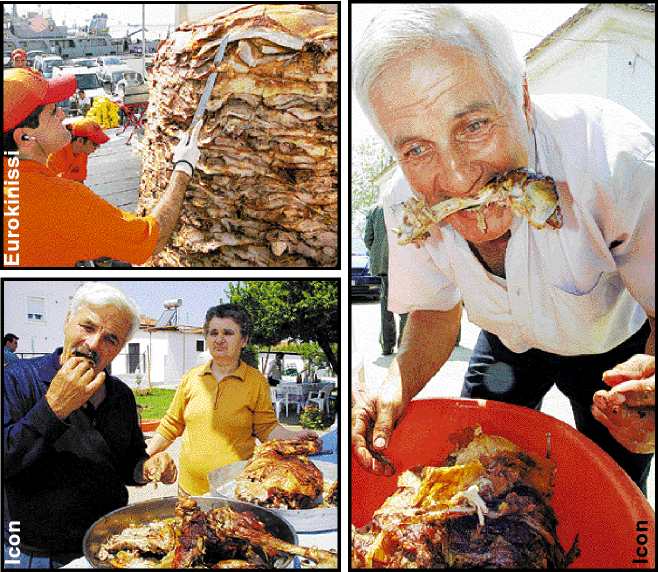 |
||
|
|
||
|
Fleshed Out
Far from following the frugal Mediterranean diet, Greeks eat a massive 340 percent more meat than the recommended amount. Much to the dismay of nutritionists... By Connie Phillipson info@nutritionaladvisor.com |
 |
|
|
WHICH obese race will do nothing about their obesity? One in four fat Greeks, that's who. And this, by their own free admission, under no pressure or any other constraints. That fact, together with many others about what Greeks think about their diet and other relevant questions, was made public in March in Athens, by the Aristides Daskalopoulos Institute. The source was a research project undertaken on its behalf by MRB Hellas SA on the dietary habits of the Greeks. The sample was fairly large as such projects go in this country, 1,300 persons queried, comprising an almost equal number of men and women, and this detailed quantitative telephone inquiry covered perhaps for the first time the whole of Greece. The release makes fascinating reading for a nutritionist, but it is also of general interest for what it shows. |
||
|
One of the first things to notice is that four in ten admit to being overweight or obese. The causes for this are listed as too much food (particularly fatty foods), a lack of exercise and the absence of willingness to ameliorate their condition - in fact, one in four does not intend to do anything about it. The people questioned thought that the most effective way of dealing with the situation is more exercise (95 percent), adequate information (87 percent), and a reduction of the amount of food ingested (84 percent). But at the same time, fewer than half exercise "almost" every day, 15 percent exercise 3-4 times a week, and so on, figures that seem like wishful thinking more than anything else. On the strength of this observation alone, one must suspect either a great deal of unconscious lying (a wish presented as an accomplished fact), or that the survey is simply not representative. Remarkable as the admission may be that one in four fat Greeks does not intend to do anything about it, this is not the most notable. What is really striking is that people appear to have never heard of metabolic disorders or hormonal imbalances, which today may be one of the primary reasons for obesity becoming a full-blown epidemic. The reasons are not hard to seek. The two principal sources of information distinguished are first the media, such as radio and TV, and second a variety of printed materials that have to do with diet or nutrition. But only slightly over one in ten says that the information is obtained from specialised scientists (nutritionists, dieticians or medical practitioners), by all accounts an extremely small percentage. Despite that, six in ten consider their diet from good to very good, while only four in ten admit to a so-so or poor diet. This is particularly revealing in view of what they eat. A non-Mediterranean diet |
||
|
Baked noodles with spinach and yoghurt Low-fat chocolate souffle Serves 8 Preheat oven to 175C. Place chocolate chips or carob in a bowl and place it in hot water to melt stirring with a spoon. Place remaining ingredients in a food processor and blend till smooth and creamy. Add melted chocolate and puree a few moments. Pour into a very lightly oiled 1-litre souffle dish. Bake for 40 to 45 minutes, or until the souffle has completely puffed up. Cool for 5 minutes. |
||
| (Posting date 24 April 2006) HCS readers can view other excellent articles by Connie Phillipson in the News & Issues and especially the sections of our extensive, permanent archives at the URL http://www.helleniccomserve.com./contents.html
All articles of Athens News appearing on HCS have been reprinted with permission. |
||
|
||
|
|
||
|
2000 © Hellenic Communication Service, L.L.C. All Rights Reserved. http://www.HellenicComServe.com |
||

